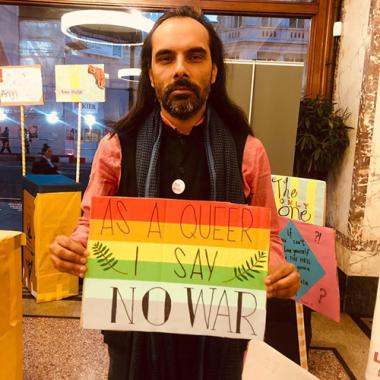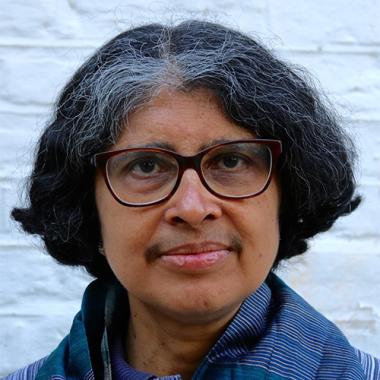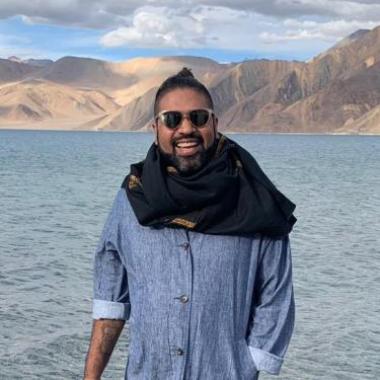The Centre for the Study of Democracy (CSD), within the School of Social Sciences, has research themes that include gender and sexuality as well as Post-Colonial Politics, Development and Emerging Powers.
There is an explicit focus on engagement with communities and impacting upon public debates around these contentious subjects. India is one such region.

About this Event
This event is an exploration of the larger theme of homonationalism globally – a term originally coined by Jasbir Puar to explain the association between nationalists and members from the LGBTQ community. In some places, right-wing nationalisms that would in the past dehumanise LGBTQ persons have sought to reframe themselves and appropriate and discipline LGBTQ movements. Islamophobia is deployed by many instances of these homonationalisms.
This panel discussion will focus on the growing trend of #homohindunationalism in India, where in there has been an attempt to label and pass rightwing Hindu government policies as pro-lgbtq community even though the track record of Hindu nationalism is resolutely queerphobic.
Is this a welcome change on the part of the right wing? Or, is it a cynical move to present a progressive and liberal face in the West? Or is it a ploy to prevent solidarities between LGBTQ and religious minority communities in India? For instance, why would sections of queer movement rally in favour of Indian government’s unilateral annexation of Kashmir while others oppose it? Is the representation of right-wing Hindu nationalist action as ‘liberating the LGBTQ community of Jammu & Kashmir’ partly fair? How is the queer community in India responding to recent large scale protests against discriminatory citizenship laws? Should LGBTQ movement, still nascent in India where homosexuality was decriminalised only recently, keep out of solidarity politics and focus on Pride as celebration or should it become immersed? What is the controversy over the Transgender Persons Act 2019 all about? How are activist queer spaces organized and what are the hierarchies of oppression that exist within these? What challenges exist in South Asian diasporas in general and Indian diaspora in particular when it comes to negotiating LGBTQ rights/identities and cultural identities?
This multi-disciplinary panel will bring together queer scholars who research the above themes in conversation.
About the speakers

Professor Dibyesh Anand
Professor Dibyesh Anand is the Head of the School of Social Sciences at the University of Westminster. He is the author of monographs "Geopolitical Exotica: Tibet in Western Imagination” and “Hindu Nationalism in India and the Politics of Fear” and has spoken about and published on varied topics including Tibet, China-India border dispute, Hindu nationalism and Islamophobia in India, and the colonial occupation in Kashmir.
He identifies as queer in personal and political terms.
You can find him on Twitter @dibyeshanand.

Jo
Jo is a restless planeteer and activist always thinking up new ideas and projects to work on. Their main aim in life is to make research and information as accessible as possible and they're hurtling fast towards an academic career while also being the co-founder of Almaarii and The Queer Question, both queer initiatives as well as The Circle, a mental health support group. They are also the digital editor of Gaysi Family, a queer run and led content platform for queer-desi voices around the world.
They're super active on Instagram and can be found there as @karmicdev.

Savi Hensman
Savi is a Sri Lankan-born writer, involvement coordinator and LGBTQ+ and human rights activist. She worked for the Black Lesbian and Gay Centre in London in the 1980s and ‘90s and has long been involved in anti-fascist organising.

Nishant Upadhyay
Nishant Upadhyay is an Assistant Professor of Ethnic Studies at the University of Colorado Boulder.
They received their PhD at York University, Toronto in the Graduate Program of Social and Political Thought in 2016. Their dissertation received the National Women’s Studies Association/University of Illinois Press First Book Award 2018. Prior to joining CU Boulder, Nishant taught Women's and Gender Studies at the University of Massachusetts Dartmouth and Northern Arizona University. Their book manuscript, Indians on Indian Lands: Transnational Intersections of Race, Caste, and Indigeneity, studies the formation of dominant-caste Hindu Indian diasporas in North America and Indian diasporic complicities in processes of settler colonialism, antiblackness, Islamophobia, and brahminical supremacy.
In 2019, they published a piece "Hindu Nation and Its Queers" Caste, Islamophobia, and De/coloniality in India" in Interventions: International Journal of Postcolonial Studies. Their other works can be found in Journal of the Critical Ethnic Studies Association, Cultural Studies, WSQ, Feminist Studies, and other places.


